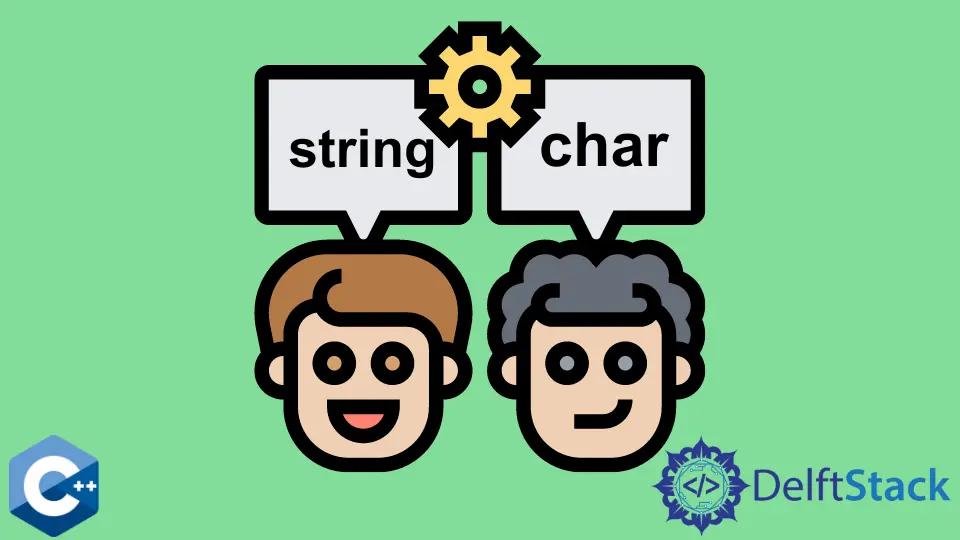C++ 中字符串和字符的比较

这个简单的指南是关于在 C++ 中使用字符串以及如何将这些字符串与其他文字进行比较。在继续之前,我们将简要介绍 C++ 中的字符串。
在 C++ 中,字符串可以按两种不同的方式分类:
- 创建一个
Character数组以形成一个字符串 - 在 C++ 中使用标准的
String库
在 C++ 中创建字符数组
与 C 语言一样,C++ 也为我们提供了字符数组,即 char 数组,它可以用作字符串文字。它是一个以 null 结尾的一维字符数组。
因此,字符串是通过形成一个 char 数组并以 null 字符终止它来创建的。
请注意,要使用聚合方法(例如,cout<< charArray)打印字符数组,null 字符必须终止字符数组。C++ 使用 \0 作为 NULL 字符,它有助于聚合方法来检测字符串的结尾(如果没有一些结束标记符号就不可能检测到数组的结尾)。
因此,下面的示例声明了一个大小为 11 的字符数组,尽管 C 语言仅包含十个字符。
char word[11] = {'C', '-', 'l', 'a', 'n', 'g', 'u', 'a', 'g', 'e', '\0'};
上面的语句也可以写成下面这样,前提是你遵循初始化规则。
char word[] = "C-language";
如果你忘记将 null 字符放在末尾,编译器会隐式地将 null 字符放在末尾。让我们看看下面的程序。
#include <iostream>
using namespace std;
int main() {
char word[11] = {'C', '-', 'l', 'a', 'n', 'g', 'u', 'a', 'g', 'e', '\0'};
cout << "First message: ";
cout << word << endl;
return 0;
}
上述代码片段中的第 06 行将向输出提供 First Message:,而第 07 行将显示 word 变量中的所有字符,直到遇到\0。因此,上面的代码片段将生成以下输出。
First Message: C-language
在 C++ 中使用 String 库
C++ 有一个内置的 string.h 头文件作为其标准库的一部分。它提供了一系列功能(例如,strcpy、strlen 等)来处理 C 风格的字符串(即,以 null 结尾的字符串)。
请注意,所有没有 .h 的现代 string 库都与 string.h 不同。string 类库 是一个用于操作现代 C++ 字符串的 C++ 库,而 string.h 是一个用于操作 C 样式字符串(即以空字符结尾的字符串)的 C 头文件。
让我们看看下面的代码来理解 string.h 库。
#include <string.h>
#include <iostream>
using namespace std;
int main() {
char country[] = "Pakistan";
char countryTemp[50] = "abc";
cout << "countryTemp length before initializing is:";
cout << strlen(countryTemp) << endl;
// strcpy()
cout << "Let's copy country to countryTemp" << endl;
strcpy(countryTemp, country);
cout << "countryTemp=" << countryTemp << endl;
cout << "countryTemp length after copying country is:";
cout << strlen(countryTemp) << endl;
return 0;
}
上面的程序首先声明了两个字符数组(C-strings)并用 Pakistan 初始化第一个。第 10 行打印 countryTemp 的长度,即 3。
虽然 countryTemp 的总大小为 50 个字节,但 strcpy 只能根据 NULL 字符(放置在数组的第四个字节)计算大小。因此,strcpy 返回 3。
第 14 行使用 strcpy 函数将 country 数组的内容复制到 countryTemp。因此,countryTemp 的新长度变为 8。
输出:
countryTemp length before initializing is:3
Let's copy country to countryTemp
countryTemp=Pakistan
countryTemp length after copying country is:8
注意:
string.h头文件为NULL终止的字符串(也称为 C 样式字符串)提供了许多函数。可以在此处找到更多可用的库函数。
C++ 中字符串与 Char 的比较
人们将字符串与字符常量进行比较是一个常见的问题。这实际上是不可能的。
参考下面的代码。
#include <iostream>
using namespace std;
int main() {
cout << "Do you want to proceed (y or n)?\n";
char inp;
cin >> inp;
if (inp == "y") // error here
cout << "Hello again" << endl;
else
cout << "Good Bye" << endl;
return 0;
}
在这个函数中,我们从用户那里做了一个输入,它是一个 char 变量,在 if 条件下,我们将它与一个用双引号括起来的字符串文字进行比较。此代码将生成错误:ISO C++ 禁止在指针和整数之间进行比较错误。
建议在 string 变量而不是 char 变量中进行输入以避免此错误。
#include <iostream>
#include <string>
using namespace std;
int main() {
cout << "Do you want to proceed (y or n)?\n";
string ans;
cin >> ans;
if (ans == "y") // error here
cout << "Hello again" << endl;
else
cout << "Good Bye" << endl;
return 0;
}
输出:
Do you want to proceed (y or n)?
n
Good Bye
Husnain is a professional Software Engineer and a researcher who loves to learn, build, write, and teach. Having worked various jobs in the IT industry, he especially enjoys finding ways to express complex ideas in simple ways through his content. In his free time, Husnain unwinds by thinking about tech fiction to solve problems around him.
LinkedIn